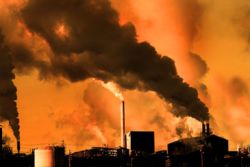UN Reports Predict Dire Effects of Climate Change

Immediate action required to prevent economic and health crises
The UN's Intergovernmental Panel on Climate Change (IPCC) released reports in March and April 2014 that predicted dire environmental and economic consequences if the world's leading economies do not act to reduce greenhouse gas emissions immediately. Climate change has already caused the melting of glaciers, coral reef damage, and drought, according to the IPCC. Near-term repercussions include a rise in sea level, a shrinking of ice and snow cover, crop loss, destruction caused by coastal storms, and increased poverty. In addition, one report said drought caused by global warming could contribute to geopolitical conflicts over water and land. In fact, several scholars and experts blame some of the current political instability in the Middle East on drought. "Throughout the 21st century, climate-change impacts are projected to slow down economic growth, make poverty reduction more difficult, further erode food security, and prolong existing and create new poverty traps, the latter particularly in urban areas and emerging hot spots of hunger," the report released on March 31 said. Some 1,250 experts from around the world contributed to the 2,500-page report. In order to prevent such crises, the IPCC said the world's wealthy nations must begin to cut global emissions by 40% to 70% by 2050. If that goal is not met, then the global atmospheric temperature will increase by 2ºC (3.6º Fahrenheit) above pre-industrial levels, the point at which scientists think they're worst fears will be realized. Emissions have increased twice as much between 2000 and 2010 as they did in the second half of the last century. The panel recommended reducing the world's reliance on fossil fuels and turning to renewable sources of energy. It said fracking for natural gas is an attractive alternative to coal. The report said given the decrease in costs of solar energy, hydropower, and making vehicles more fuel efficient, reaching the goal would not create a financial burden for most countries and businesses, nor would it require individuals to sacrifice their quality of life. "There are those who say we can't afford to act," Secretary of State John Kerry said in a statement. "But waiting is truly unaffordable. The costs of inaction are catastrophic." Poor and developing countries, which contribute the least to global warming, are the most at risk and require some $100 billion in aid each year to adapt to climate change, according to the report. On the bright side, the report acknowledged that many countries and businesses understand the scope of the problem and their role in it and have begun to address it. |








